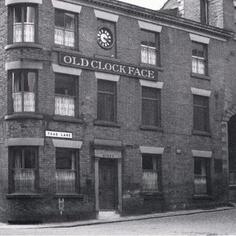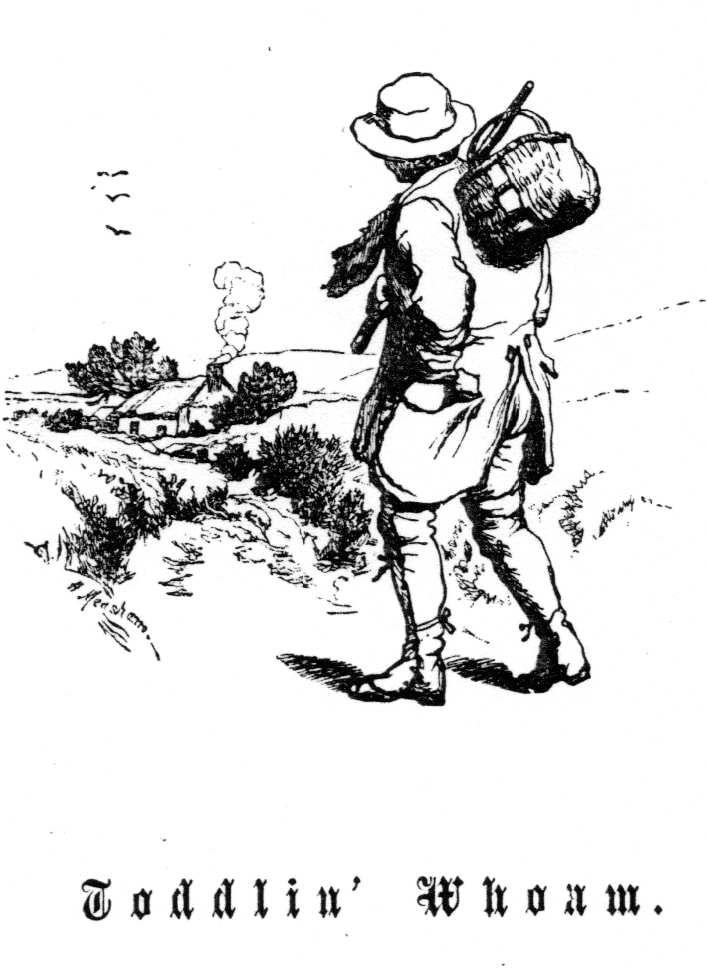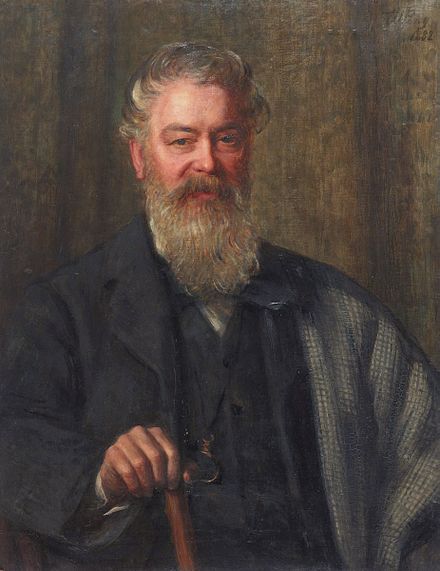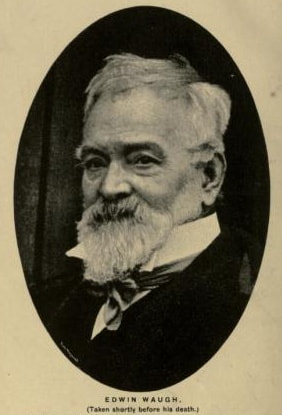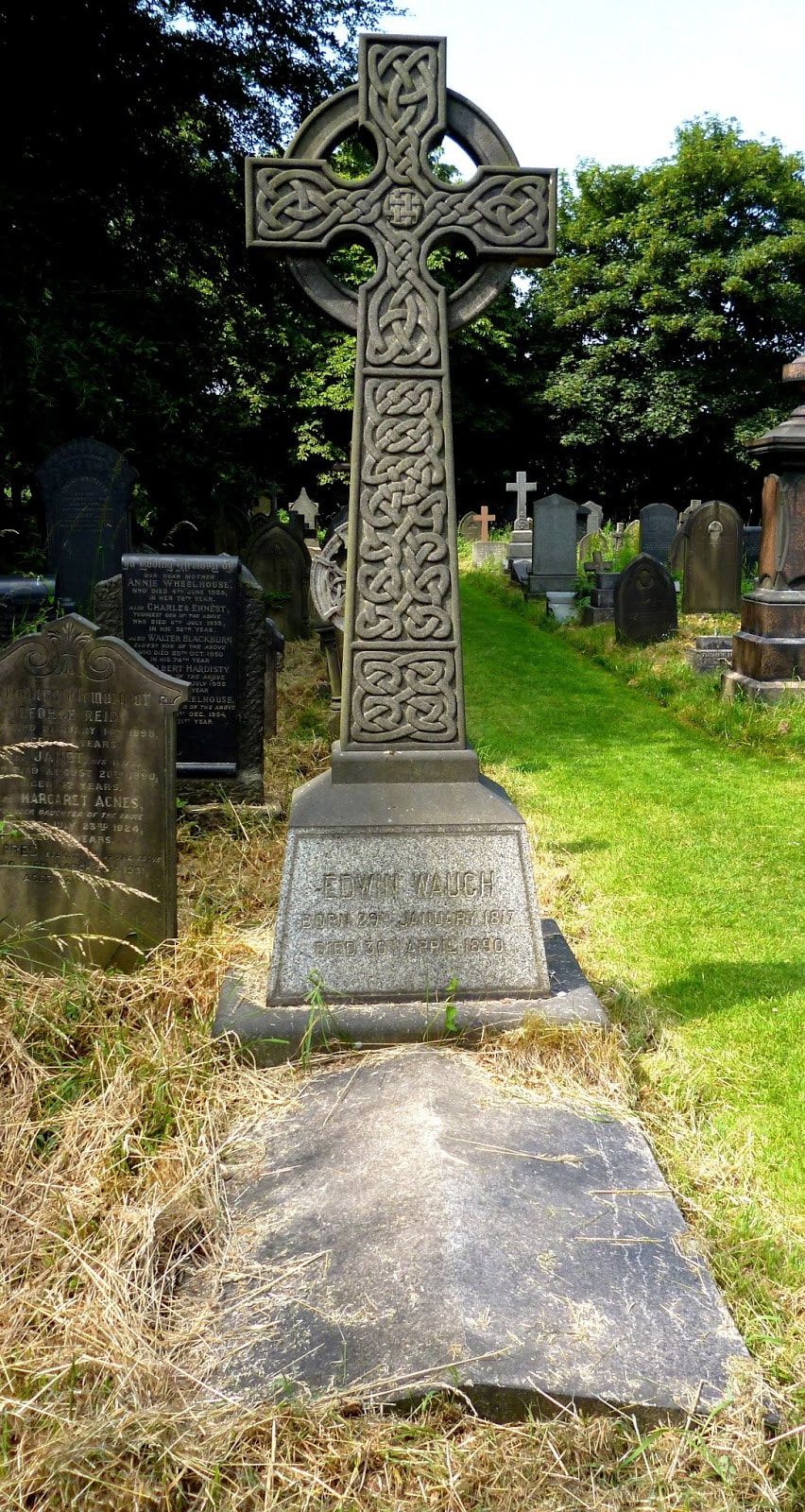EDWIN WAUGH
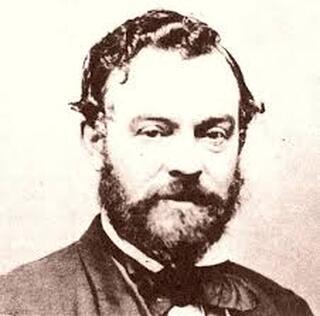 Edwin Waugh aged 44
Edwin Waugh aged 44
Other References
WIKIPEDIA
https://en.wikipedia.org/wiki/Edwin_Waugh
More EDWIN WAUGH'S writings and those of other authors
https://minorvictorianwriters.org.uk/index.htm
WAUGH OR WOFF?
There is some controversy as to the pronunciation of his surname. Those of us who know of the more recent writer, Evelyn Waugh, automatically assume that Edwin's surname was pronounced in a similar way. However, some people, our late secretary Anne Ridgeon and John Howarth of the Oldham Tinkers amongst them, insist that it should be Woff as this was the assertion of one of our late presidents, Harvey Kershaw. Harvey was a friend of both Anne and John and he was highly respected in the world of Lancashire dialect.
Brief Biography
|
Edwin Waugh was born on 29th Jan 1817 in a house either next to or on the site of the "The Old Clock Face Inn" in Toad Lane, Rochdale. There is a little bit of controversy about which is the correct version. A plaque marks the site in the shopping centre which now stands on the spot at the junction of Toad Lane and Lord Street.
|
OLD CLOCK FACE
In the 1960's this pub held weekly folk nights. Star turns were Harry Boardman, Harry Ogden and sometimes the Lancashire poets Harvey and Mary Kershaw. It closed in 1973 and has since been demolished. Picture source: Neil Myers
|
|
In 1824 at age of 7, he started school; and in 1829 aged 12, he started work as an errand boy for a printer and preacher, John Walker of Townhead.
In 1831 aged 14 he started a 7 year apprenticeship with a Tory printer and bookseller, Thomas Holden for 2/6 a week. Here he both educated himself and met many influential people. In 1839, aged 22, he became a journeyman printer at the princely wage of 11/6 a week. Having travelled in London and the South of England, he returned to Rochdale in 1844 and became assistant to Thomas Holden. He married Mary Ann Hill on 11 May 1847 but sadly the marriage was not a success and they had money troubles. At this time he started keeping a detailed diary and writing both prose and poetry. In September he started a new job as Assistant Secretary to the Lancashire Public Schools Association and moved to Manchester. In 1849, he unsuccessfully tried to end his addiction to snuff and alcohol. He had heavy debts and the following year Mary moved back to Rochdale. He wrote several poems and articles for a Manchester Newspaper. He gave up his school job in 1852. 1855 was an important year. Edwin and Mary Ann separated permanently, he wrote and published his first book of prose, "Sketches of Lancashire Life and Localities" and was part-time editor of "The Spectator". In the summer of 1856 he wrote what is possibly the most famous dialect poem in the world, "Come Whom to thi Childer an' Me" for the "Manchester Examiner" and for which he was paid one guinea. Thousands of copies were sold as penny broadsheets which brought him instant fame. He became a regular contributor to the "Manchester Examiner" and "Weekly Times" and in 1857 wrote "Poems and Lancashire Songs", which some class as his best dialect poems. At the age of 43 he decided to write and perform his writings for a living and when the Manchester Literary Club was formed in 1862, he was one of the founder members. In 1861 he had written "Rambles in the Lake Country" and the poem "A lift on the Way" which was later set to music. Using Benjamin Howarth of Lobden Moor as his model, he wrote his book of "Besom Ben Stories" in 1865. How much is truth and how much fiction is a source of much conjecture. He used to spend time at Fo' Edge Farm, east of Edenfield, and it is by the site of the now derelict farm that we find Waugh's Well, dedicated to him in 1866, as he spent many happy hours there, writing. His pantomime for the Prince's Theatre in Manchester, however, was a failure. In 1867 he wrote "Home Life of the Lancashire Factory Folk during the Cotton Famine, 1862". During the next few years he gave penny readings and lectures in many towns and cities of the north. He started to write a play and a novel though neither was finished. Between 1872 and 1874 when he became afflicted with opthalmia, he wrote "Rambles and Reveries", "Tufts of Heather" and "The Chimney Corner". In 1876 a fund was raised and a committee formed to take over his copyrights. This ensured a fixed annual income and left him free to pursue his various literary projects. In the same year he became Life Vice President of the Manchester Literary Club who formed a committee to publish his works. Ten volumes edited by George Milner were produced between 1881 and 1883 and an eleventh volume in 1889. As Waugh's health began to fail at the age of 60, he moved to Kersal Moor north of Manchester for fresher air and Prime Minister Disraeli was approached for a pension for him. At age 64 he wrote a series of articles for the "Manchester Weekly Times" about times up to his being 22, under the heading "An Old Man's Memories". It would have made a book but didn't and presently all 67 chapters are in Accrington Public Library. About this time another claim for a pension for him was sent to the now prime minister, Mr. Gladstone. In 1882 he was granted a civil list pension of £90 and the Royal Literary Fund Committee granted him £100 in monthly instalments of £5. He had also begun to suffer with erysipelas - red skin. Some time around 1883, at the age of 66, he joined the Brazenose Club in Manchester and moved to New Brighton in an attempt to improve his health. His 70th birthday brought a celebration at the Queen's Hotel in Manchester, attended by many leading social and political figures. That year he also visited the Isle of Rhum, Meggernie Castle and Glen Lyon in Scotland, thanks to a friendship formed with John Bullough of Accrington some eleven years earlier. However, his health deteriorated seriously in 1888 and he had trouble speaking due to pain in his tongue necessitating two operations. He visited London and the House of Commons where he had dinner with several Lancashire MPs. The end came on 30th April 1890 when he died of cancer of the tongue at 8 pm at his home, 'The Hollies', in New Brighton. On Saturday 3rd May 1890 he was buried at St. Paul's Church, Kersal Moor near Prestwich. There were many friends, acquaintances and admirers at his funeral. (C) John B. Taylor and here published with his permission. |
